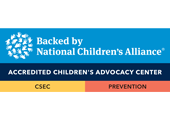We Can Prevent Child Abuse Together
April 18th, 2022
In the United States, National Child Abuse Prevention Month is annually observed throughout the month of April. It is a critical time to raise awareness of our nation’s child abuse crisis. The statistics remain overwhelmingly alarming that one in four girls — and one in six boys — will be sexually abused before their 18th birthday. Most victims suffer in silence as it is estimated that more than 90 percent of abuse victims never report what happened to them. Even more disturbing is that more than 90 percent of perpetrators are someone an abused child knows and trusts – a coach, camp counselor, teacher, someone in their faith community, or a family member.
This month child safety advocates across the state and nation are urging communities to come together to make a difference. We ask that parents and caregivers “Have the Conversation” with their children, their family, and friends about sexual abuse, and begin to talk with young children about body safety. This includes which parts of their bodies are private, not to be touched by anyone, and reminding them they need to immediately tell an adult they trust if someone has touched them inappropriately. As children get older, these conversations can evolve into discussions about personal privacy, online safety, and consent. By starting these discussions when children are young, and having them often, parents and caregivers can open the gateway to communication about all types of “difficult” topics across the span of a child’s development into an adult.
If child victims disclose their sexual abuse, most often it is to a safe adult who is obligated by law to report it, and that adult is known as a mandated reporter. Mandated reporters in Massachusetts include a wide range of professionals, most notably, teachers, coaches, therapists, and guidance counselors. As the child advocacy center for Cape Cod and the Islands, we work with our multidisciplinary partners to respond to these disclosures and provide compassionate, comprehensive, and collaborative response services at no cost to survivors of child abuse. Collectively we utilize our evidence-based programs, network of community partnerships, educational outreach, and awareness efforts to empower survivors, promote healthy outcomes, and help mitigate the stigma of child abuse.
for too long, sexual abuse has been a taboo subject hidden in the shadows, increasing the likelihood of the victimization of children”
We can make a strong impact in the prevention, early recognition, and coordinated response to child sexual abuse on Cape Cod, Nantucket, and Martha’s Vineyard. We can do this by working together to help parents learn how to break the stigma of talking about child sexual abuse. Let’s teach children about body safety and foster healthy communication between children and their parents about difficult subjects. Our community should offer regular and ongoing training for professionals who work with children to help them effectively recognize and respond to someone who may have been abused. And we can ask organizations who serve children to institute effective policies and procedures mandating such training and instituting rigorous hiring practices.
As a community, we need to provide a safe environment for all children in our public spaces, in schools and in organizations that serve children. Our first step in achieving this level of safety is for everyone to make preventing sexual abuse a priority. For too long, sexual abuse has been a taboo subject hidden in the shadows, increasing the likelihood of the victimization of children. It is not easy to identify a predator in the community, at work, or even in one’s home, as they are most often people we know and trust. However, we can work together to reduce the instances where that predator is able to take advantage of a child.
The more we bring these discussions to light, the closer we will be to a community where children are free of abuse, have a voice that is heard, and where they enjoy healthy, safe, and empowered lives.
If you have a concern that a child isn’t safe, or may need help, please click here to find the next steps to get someone support.






